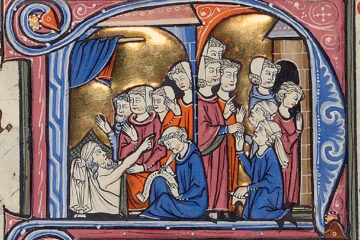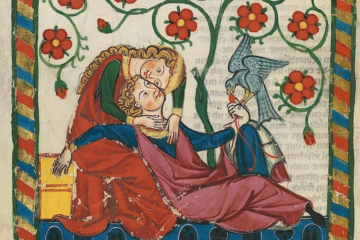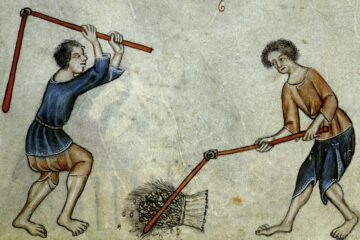After the turbulent Fifty Years’ War and the rise of the Mongols, many people have been forced to migrate from their homelands. Borders are not things of stone, and can easily shift depending on who lives where, instead of the other way around. A few different peoples have found themselves without homes in the wake of the recent socio-political upheaval that has come to plague Europe and Asia.
The Allemen
Allemen comes from the Aqvintian word for German, as their language is more similar to Old Frankish than the language spoken in the north of France, Franco-Saxon, or simply French. The Fifty Years’ War that took place between 1127 and 1180 engulfed most of Frankia and parts of Germania. After peace had been achieved it didn’t matter much whether you were on the French or German side of the border; families and villages were destroyed either way. Many French peasants migrated eastwards into the Holy Roman Empire, while a large number of Germans moved into French lands. During the Restoration, King Philip II offered subsidies to the March Lords who took these people in and gave them land to live and work on. The Aqvintians, as the most numerous people in France, dubbed all migrants from Germany as “the Allemen”.
Due to its proximity to the border, Rosewood has no qualms with the Allemen and welcomes them, as they are seen as hardy laborers and good mercenaries. Most of them keep their German names and practice a harsher, stricter form of Catholicism. If not referred to as the Allemen, then they are surely called Papists within Rosewood, due to their support of the Papacy. Even though public sentiment towards them in the Capital is high, the further you are from the Roman border, the more hostile locals and legislature become towards them. In general, as they are not too foreign, most people will not have a problem with someone who is Allemen.
The Gypsies
No one knows where the Gypsies come from. The leading theories are that they are from the Far East, from India, from Egypt, or from Persia. Either way, their arrival in Europe was first documented by the Romans around 1080 when they migrated from inside the Cuman Horde. While not all of their people left, one of the largest migrations ever seen took place when the Cuman empire began its slow collapse. They settled around the Black Sea, in Jersualem, and around the Nile delta where they remained for the most part. However, recently the rise of the Mongol horde has pushed all of their people westward. The ones who settled in Byzantium and Jersualem were expelled and forced to find a new place to call home, while the newcomers followed. Depending on where they are from, the Gypsies are called different names. In the lands of the Romans and Jerusalem, they are Tsigani, in Iberia, they are the Calé people, in the Holy Roman Empire, they are the Sinti, while the rest of Europe calls them many different names, Gypsy being the most prominent across the continent.
In Rosewood, Gypsies are seen as undesirable if they are not Catholics. If they are, then people tend to avoid them, but are not outright hostile towards them. Those who leave their faith ambiguous, keep their traditions and names, and practice magic are usually forced out of the Capital or arrested by either the City Watch or the Inquisition. Most Gypsies have a reputation of being thieves, entertainers, or dream interpreters.
The Cumans
Before the rise of the Mongol Empire, the lands of the distant Rus, and beyond the Urals were ruled by the Cumans, a nomadic, tribe people from around the Kaspian Sea. They won the struggle for the land they occupied and forced their way into both Europe and Asia. They are the reason for many migrations, but eventually, they were forced to migrate themselves by the Mongols of the East who began to conquer their lands. Some, preferring assimilation rather to death, decided to flee into Europe in the wake of their horde’s collapse. As a token of gratitude, the Cumans were awarded the lands of Cumania in the Ruslands for defending Christendom during the Fourth Crusade; on the condition, they converted and most did. However, the subsequent years have proved difficult for the Cuman people of Cumania, as the nobility were Roman Catholics, while the majority of the people living there had adopted Byzantine Orthodoxy. The King expelled most of the Orthodox Cumans, as well as the Muslims, and any others who were not Catholic. They were forced westwards and eventually they have begun to make their way to Rosewood’s walls.
In Rosewood, the Cumans are seen as foreign and mysterious. They are tolerated within the walls and are often sought after as horse breeders, stablemasters, and even cavalry comanders, due to their horseriding traditions. The Inquisition is not kind to them, actively looking for reasons to either arrest or expell them.
The Vikings
Legends tell of the Northmen who invaded Europe and plundered and looted their way to Constantinople and further. During the Viking Age, none were safe from the Scourge of the North. However, after the realms of Scandinavia christianized, a large population of pagans chose to flee, rather than face conversion or death. Most live in the north of Scotland and Ireland, while they have a Kingdom in Iceland. However, English, Norman, German, Italian, and even Iberian coasts are still littered with their remnants. Some of them pretend to be part of society, while others actively oppose it. Either way, most of them seek freedom in Iceland where they are promised “a Great Raid”.
In Rosewood, the Vikings are seen as absolute evil. So much so in fact that even those with Scandinavian ancestry are seen as untrustworthy, despite being Christians. They are known to be powerful warriors and amazing shipwrights, as well as fisherman and sailors. However, the peasantry in France also knows that they were amazing farmers, with those families who possess some Viking heritage, famous for their ability to tend the fields of Normandy.
The Jews
The Jewish people have been present in Europe for a long time, even before the First Crusade. However, it was after the First Crusade, and the start of the Christian Crusader Kingdoms, that Jews began to actively migrate westward. Forced off of their ancestral land by the Crusaders, by the Muslims, and now by the Mongols, the Jews are present in every Kingdom in Europe; mostly in Spain, France, Germania, and Poland.
In Rosewood, Jews are seen as a tolerated people and even respected in some circles. Due to their unique position of being able to lend with interest, the Medici banking family employes them within Rosewood, and beyond, as their bankers. They are also regarded well for their mysticism and religious nature. As such, they are often advisors, or acquaintances to nobility and clergy alike. Finally, they are talented artisans and amazing carpenters and stonemasons. However, their fortune is only as strong as is the fortune of the City and France, since as soon as some calamity befalls either, the Jews are the quickest to be blamed.
The Turks
The Turks are an ancient tribe from Asia who carved their way into Europe through Persia and Mesopotamia, slowly into Judea and Anatolia. During the age of Seljuk dominance in the region, Tukrs were locally regarded as magnificent warriors and great scholars, working in tangent with Arab men of greatness in order to advance their societies further. However, due to infighting, foreign invasions, and due to the Mongol threat, the Seljuk Sultanante broke down and was forced westward, with its people going even further. The Turks mostly settled in the region of Anatolia and set up fledgling tribes after the fall of Rum, but were eventually conquered by the Romans. As instability mounts in the region, some Turks migrate to the west, eventually reaching Rosewood.
In Rosewood, Turkish men are respected for their knowledge, while the women are regarded for their beauty. They have arrangements with the Univeristy for the preservation of Islamic knowledge and its incorporation into Christian Europe. However, they are frowned upon by regular people due to their faith. Those on hard times, or easily influenced by the Church, will not want to associate with them, while the more affluent members of Rosewood’s society will rather judge them based on their character, as is the case with most of the above.


